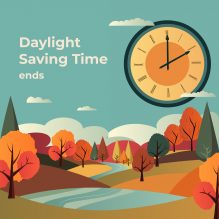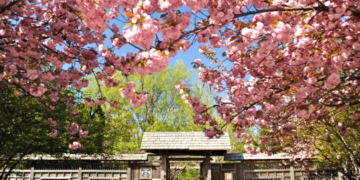As the end of Daylight Saving Time approaches, it is time to remember to set our clocks back one hour. While this means we’ll have an extra hour in our day, it also means that we need to take some precautions to stay safe and prepared for the colder months ahead.
Stay alert on our roads
As daylight hours shorten this time of year, it makes it harder to see on our roads. Whether you’re walking, cycling or driving, remember to be aware and stay alert to prevent collisions. If you’re driving, be aware of the posted speed limit and watch for pedestrians and cyclists, especially when turning. To help increase your visibility, use designated crosswalks or crossrides to cross the road if you’re walking or cycling, and use lights and reflectors on your bike.
Check your alarms
Check your smoke and carbon monoxide alarms are working properly. Test them by pushing the test button and vacuum them to remove dust particles. Smoke and carbon monoxide alarms can lose their effectiveness over time, so if yours are expired, purchase a new one at your local home and building store. You can also change batteries once a year and when you hear the low-battery warning beep. Your smoke alarms can be upgraded to newer models with longer battery life, so you don’t have to worry about replacing the batteries for a few years.
Shut off water to your garden tap and hose
Drain water from outdoor hoses and shut off outdoor faucets from indoors pipes to prevent them from freezing once the temperature falls below zero. If water is not drained during the winter, it could freeze and cause your pipes to burst. Remember to keep the heat in your home on to help plumbing pipes stay warm.
Inspect outdoor drainage, eaves troughs, downspouts and rain barrels
Ensure that eaves troughs, downspouts and basement window wells on your home are clear of leaves, debris, and any blockages, and that downspout extensions direct water away from any building foundations. Window wells can be covered with clear plastic covers to keep debris out, but must still permit escape. Rain barrels should be disconnected and emptied and water from the downspout should be directed at least 2 metre away from your basement walls.
Drain outdoor pools, hot tubs and spas
Pool chemical harm downstream creeks. Stop adding chemicals to the pool or spa for at least 7 days before draining the water and leave the cover off to allow sunlight to break down the chlorine. On dry days only, drain water slowly by a hose long enough to reach the street.
Cleanout dryer hoses, fireplaces and chimneys
It’s a good time to clean your dryer hose to prevent fires. Cleaning your lint filter, emptying or replacing your dryer hose and regularly checking the vent and exhaust can help prevent fires. While you are at it, check both your fireplace and chimney cleaned and inspected. Clogged chimneys can cause house fires and carbon monoxide poisoning. Make sure your chimney flue works so you don’t experience drafts.
Clear debris from catch basins
Ensure that stormwater can flow freely by removing garbage, debris or leaves that block or clog catch basins. Residents can also report blocked catch basins that are not draining to 311.
Dig out our winter essentials
Winter outdoor clothing essentials are a must-have with spending time outdoors during the colder months. Accessories such as hats, gloves, scarves and warm waterproof boots are also important to protect against frostbite and keep extremities warm.
Put on your winter tires
Winter tires are designed for cold climates and offer enhanced traction, giving a better grip on roads and reducing braking distances. Try to get your tires on before temperatures dip below the freezing mark.
Winterize your car
Before the snow and icy weather start, make sure your car is ready for winter. In addition to getting your winter tires put on, test your car battery, check your coolant, top up your fluids, test out your wipers blades and clean your headlights, and make sure you have an emergency preparedness kit.
With the end of Daylight Saving Time, stay safe and enjoy the extra hour! Remember to take extra precautions as the days get shorter and darker.





















